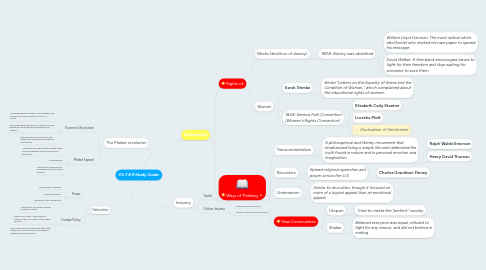
1. The Market revolution
1.1. Economic Revolution
1.1.1. The Telegraph was created in 1837 based on the invention by Joseph Henry and Sam F.B. Morse.
1.1.2. Canals opened the heartland of America to world markets by connecting the Northeast to the Midwest.
1.1.3. Railroads grew to be both safe and reliable, and had goods sent faster to other places.
1.2. Market Expand
1.2.1. Capitalism, was the economic system which private businesses control the means of production.
1.2.2. Entrepreneurs.
1.2.3. Production of clothing was increased due to the sewing machine.
2. Nationalism
2.1. Power
2.1.1. McCullough v. Maryland
2.1.2. Steamboat service
2.1.3. Blocked of state interference
2.2. Foreign Policy
2.2.1. Nationalism, our nations interest is ahead of others
2.2.2. Adams Onis Treaty- Spain gave up Florida to the U.S. as well as the Oregon Territory
2.2.3. The Monroe Doctrine would stop the United States from involving itself in European or Western Hemisphere affairs.
3. Industry
3.1. Textile
3.1.1. Raw Fiber and Clothing
3.1.2. Apprentices
3.2. Cotton Industry
3.2.1. Goods produced for home
3.2.2. Children would help with this work
4. Reformation
4.1. Rights of:
4.1.1. Blacks (abolition of slavery)
4.1.1.1. 1808: Slavery was abolished
4.1.1.1.1. William Lloyd Garrison: The most radical white abolitionist who started his own paper to spreed his message.
4.1.1.1.2. David Walker: A free black encouraged slaves to fight for their freedom and stop waiting for someone to save them.
4.1.2. Women
4.1.2.1. Sarah Grimke
4.1.2.1.1. Wrote "Letters on the Equality of Sexes and the Condition of Woman," which complained about the educational rights of women.
4.1.2.2. 1848: Seneca Falls Convention (Women's Rights Convention)
4.1.2.2.1. Elizabeth Cady Stanton
4.1.2.2.2. Lucretia Mott
4.1.2.2.3. Declaration of Sentiments
4.2. Ways of Thinking
4.2.1. Transcendentalism
4.2.1.1. A philosophical and literary movement that emphasized living a simple life and celebrated the truth found in nature and in personal emotion and imagination.
4.2.1.1.1. Ralph Waldo Emerson
4.2.1.1.2. Henry David Thoreau
4.2.2. Revivalism
4.2.2.1. Spread religious speeches and prayer across the U.S.
4.2.2.1.1. Charles Grandison Finney
4.2.3. Unitarianism
4.2.3.1. Similar to revivalism, though it focused on more of a logical appeal than an emotional appeal.
4.2.4. New Communities
4.2.4.1. Utopian
4.2.4.1.1. Tried to create the "perfect" society.
4.2.4.2. Shaker
4.2.4.2.1. Believed everyone was equal, refused to fight for any reason, and did not believe in mating.

